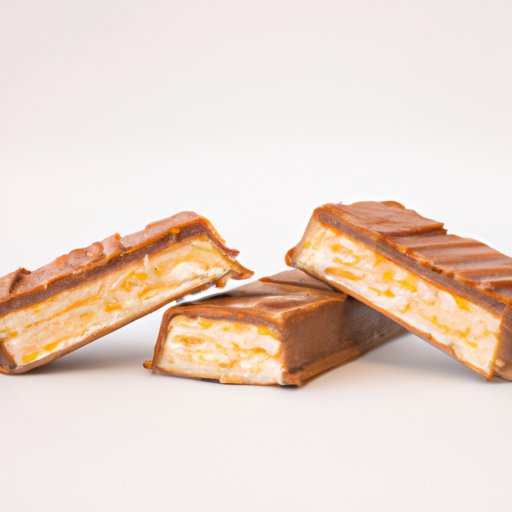
Introduction
Gluten intolerance is a common issue faced by many individuals worldwide. It is a condition where the body’s immune system reacts to gluten, a protein found in grains such as wheat, rye, and barley. The symptoms range from mild to severe, including bloating, vomiting, and stomach discomfort.
People with gluten intolerance are concerned about consuming snacks that may contain gluten, including Kit Kats. In this article, we will explore whether Kit Kats contain gluten, their ingredients, and other gluten-free snack alternatives.
“Everything You Need to Know: Are Kit Kats Gluten-Free?”
Kit Kats are a popular snack all over the world. They are made from a combination of wafers and a smooth chocolate coating. For individuals with gluten intolerance, the wafer part raises concerns if it contains gluten. Gluten is a protein found in grains like wheat, rye, and barley.
Kit Kats are produced in different countries worldwide, and the ingredients may vary depending on the location. In general, Kit Kats contain wheat flour, which may contain gluten. Therefore, it’s essential to read carefully through the ingredients list before consuming them.
It’s worth noting that Nestle, the company responsible for producing Kit Kats, states that they cannot guarantee their products’ gluten-free status due to potential cross-contamination in the manufacturing process. As a result, people with gluten intolerance should consume Kit Kats cautiously and at their discretion.
“The Best Gluten-Free Alternatives to Kit Kats”
For individuals with gluten intolerance, finding gluten-free snacks that taste good and provide an excellent alternative to Kit Kats may be a challenge. Here are some gluten-free snack options that can provide an outstanding experience comparable to Kit Kats:
- Glutino chocolate-coated wafer cookies
- Enjoy Life boomCHOCOboom rice milk crunch chocolate bars
- Schar’s chocolate-dipped cookies
- Kinnikinnick’s Kinnitoos sandwich cookies
Moreover, it’s essential to conduct research before indulging in any snack, including Kit Kats, to ensure you are choosing gluten-free products. A taste comparison chart between Kit Kats and other gluten-free snacks can be helpful in making an informed decision.
For people who dislike chocolate, other gluten-free snack options may include fruit cups, popcorn, or greek yogurt parfait.
“DIY Gluten-Free Kit Kats: How to Make Your Own Delicious and Safe Treats”
If you’re planning to enjoy Kit Kats but are concerned about gluten, consider making gluten-free Kit Kats at home. It is relatively easy and cost-effective. Here’s what you’ll need:
- 2 cups gluten-free flour
- 1/2 cup sugar
- 1/4 teaspoon salt
- 1/2 cup unsalted butter
- 1/2 cup sweetened condensed milk
- 1 teaspoon vanilla extract
- 1 cup chocolate chips
Here are the steps involved:
- Preheat the oven to 350°F.
- In a large mixing bowl, mix the flour, sugar, and salt.
- Cut in the butter until the mixture crumbly consistency.
- Stir in condensed milk and vanilla extract until it forms a dough.
- Roll the dough out into a flat sheet.
- Cut the dough into the desired shape of the Kit Kats.
- Bake for 12-15 minutes until golden brown and crispy.
- Melt the chocolate chips and dip the baked wafers.
- Refrigerate for 10-15 minute until the chocolate hardens.
Homemade Kit Kats not only provide gluten-free assurance but can save you some money as well.
“The Top 10 Gluten-Free Snacks You Can Buy at the Store, Including Kit Kats”
The market provides a vast range of gluten-free snacks for individuals with gluten intolerance. Here are the top ten gluten-free snacks that you can buy at the store, including Kit Kats:
- Nature Valley granola bars
- Glutino chocolatey covered pretzels
- Lara bars healthy fruit and nut bars
- If you crave organic chocolate truffle bars
- Schar’s gluten-free breadsticks
- Ritz’s cheese crisps
- Blue Diamond’s nut thins crackers
- Skinny dip crackers
- Simply Balanced fruit strips
- Kit Kats (Limited; read label)
These snacks were picked based on taste, price, availability, and nutritional value. They provide optimal satisfaction, and they’re also safe for individuals with gluten intolerance to consume.
“Real People Share Their Experiences: Are Kit Kats Gluten-Free?”
People with gluten intolerance have shared numerous experiences with Kit Kats and provided recommendations on gluten-free snacks.
Penny, a mother of two gluten-intolerant children, shared her experience saying, “I always research the ingredients on a product before I purchase it. Though Kit Kats are not labeled gluten-free, we have never experienced any symptoms when consuming them, as long as we moderate our intake.”
Michael, who has a wheat allergy, shared his recommendation on snacks saying, “I prefer Glutino Chocolate Wafer Cookies because they satisfy my sweet tooth, tastes the same as Kit Kats, and is labeled gluten-free.”
Readers should conduct adequate research before indulging in any snack, including Kit Kats, to ensure that they do not experience any discomforts associated with gluten intolerance, regardless of recommendations from others.
Conclusion
Kit Kats may not be the most suitable snack for individuals with gluten intolerance due to gluten cross-contamination in the manufacturing process, but alternative options are available. Safety is essential, and verifying the ingredients on the labels before purchasing any product is highly recommended.
Homemade gluten-free Kit Kats and other store-bought gluten-free snacks are excellent alternatives to Kit Kats for individuals with gluten intolerance. They provide a range of flavors, vitamins, and nutrients that can keep individuals satisfied.
Lastly, the experiences and recommendations of people with gluten intolerance should not be taken as medical advice, and individuals with gluten intolerance should discuss any dietary concerns with their healthcare provider.





